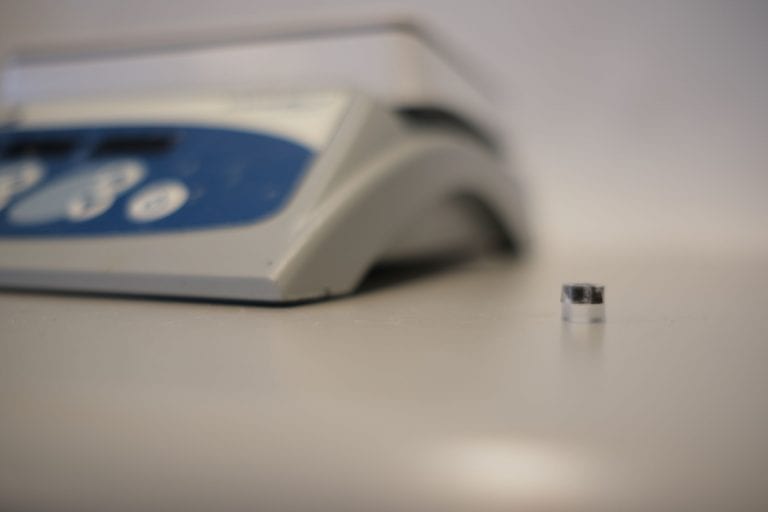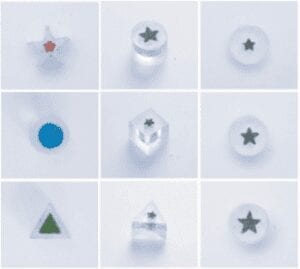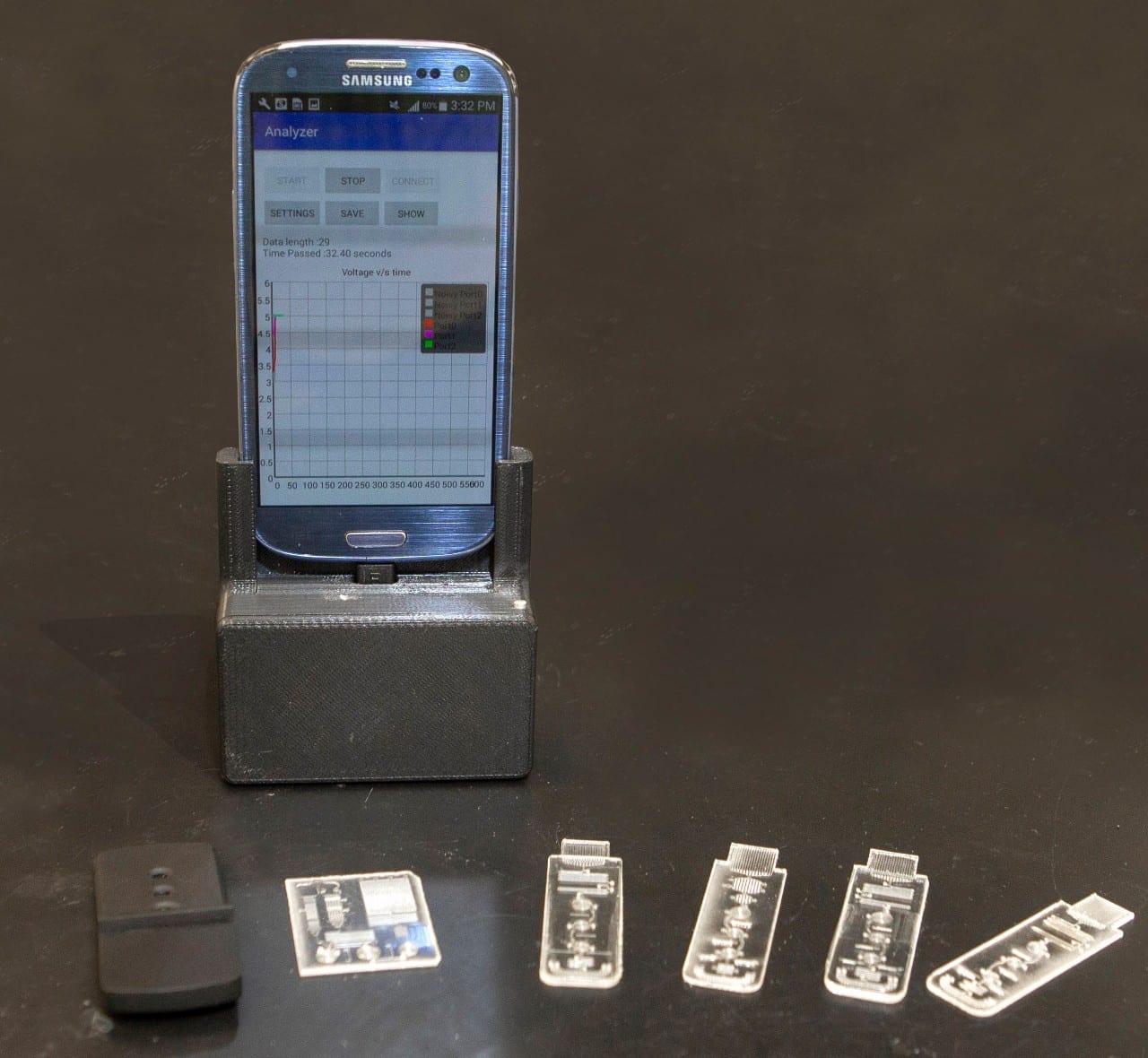Picture of the miniaturized heaters with various lithium mould shapes. (Photo: PNAS)
“Combined with smartphone technology, everyone would have a portable system that can track, monitor and diagnose infections. This is critical for preventing the spread of diseases.”
U of T Engineering researchers have developed a ‘heater’ — about the size of a pill tablet — that regulates the temperature of biological samples through the different stages of diagnostic testing. This technology could enable resource-limited regions around the world to test for infectious diseases without the need for specialized training or costly lab equipment.
“The precision and flexibility of our heater opens the door to a future of do-it-yourself diagnostic kits,” says Pranav Kadhiresan, who developed the device alongside Buddhisha Udugama (both PhD candidates in IBBME and the Donnelly Centre) under the supervision of Professor Warren Chan (IBBME, Donnelly Centre).
“We could combine the simplicity of a high school chemistry set with the precision of cutting-edge lab instruments,” adds Kadhiresan. The technology behind the team’s miniaturized heater invention is describe in a paper published in the journal of Proceedings of the National Academy of Sciences (PNAS).
In a typical diagnostic test for infectious pathogens, multiple temperature-regulation steps are involved. The ability to control temperature is crucial to the accuracy of the test results, and is especially important in areas where access to large research facilities are limited.
“The lack of electricity adds a layer of complexity,” says Udugama. “Our miniature heater addresses that. It can be used in various settings to detect viruses without the need for electricity. If we were to summarize the benefits of our technology, it would be accessibility, portability and precision.”
The outside of the heater tablet is composed of a non-reactive acrylic mould that encapsulates lithium, a reactive element that is commonly found in battery cells. When dissolved in water, the reactive lithium interacts with the solution to release heat and hydrogen gas. This results in an increase of temperature for an extended period of time.
The researchers observed that the reproducibility of the temperature profile is controlled by constant gas release, which is dictated by the shape of the lithium mould. After testing multiple shapes of the lithium mould – from circles to triangles – they found the star shape, measuring just 8 millimetres in diameter, to be the most ideal for precise heating.

Consolidating multiple steps into a single tablet also means specialized training is not required to operate any diagnostic testing, reducing the chance of human error and making the device accessible to the public.
“Tablets are conventionally used for medications such as aspirins. But we have now developed a series of tablets and pills that can diagnose diseases,” says Chan, principal investigator on this research and director of IBBME.
The Latest Updates from Bing News & Google News
Go deeper with Bing News on:
Infectious diseases testing
- Infectious Disease Experts Warn Bird Flu Outbreak Bigger Than Previously Thought
For weeks, the dairy industry has been gripped by a highly contagious virus that is threatening to only get worse. Federal regulators announced this week that samples of pasteurized milk tested ...
- Early test results show pasteurized milk with traces of H5N1 virus isn’t infectious, FDA says
The US Food and Drug Administration said Tuesday that it had detected viral particles of H5N1 avian influenza in milk purchased at grocery stores, but the agency says it still believes that the milk ...
- Ticks on Long Island: Disease-carrying critters now a year-round problem
Long Island is one of the epicenters for Lyme disease. Education and prevention are keys to avoiding tick bites and infections.
- Start Mass Testing Dairy Workers for Bird Flu
Given how devastating another global pandemic would be, the US should start mass testing of dairy workers for the bird flu virus that’s spreading fast through cows. If necessary, either the Centers ...
- Owlstone secures $6.5M for breath-based diagnostics for infectious disease
Owlstone Medical has secured a $5 million equity investment and initial $1.5 million grant funding, committed by the Bill and Melinda Gates Foundation, for development of breath-based diagnostic ...
Go deeper with Google Headlines on:
Infectious diseases testing
[google_news title=”” keyword=”infectious diseases testing” num_posts=”5″ blurb_length=”0″ show_thumb=”left”]
Go deeper with Bing News on:
Diagnosing diseases
- From understanding Parkinson’s Disease to the increased rate of cancer cases, here are this week’s talkbacks
WGAL News 8 talks to professionals to give a better understanding of important events impacting the Susquehanna Valley.
- Harry Jowsey reveals skin cancer diagnosis at age 26 — here’s what to know about the ‘scary’ disease
Harry Jowsey has been diagnosed with skin cancer at the age of 26. The former “Dancing With The Stars” contestant revealed the shock health news in a TikTok video Friday evening, urging his followers ...
- Teacher says pleas for better ventilation were ignored, then he was diagnosed with lung disease
LaMarr Walker's decadeslong career teaching agriculture and shop in southern Utah came to an early end on the advice of his doctor with a diagnosis he believes may have been preventable.
- Imaging using fundus autofluorescence can facilitate the diagnosis and monitoring of rare eye diseases
Uveitis is a rare inflammatory eye disease. Posterior and panuveitis in particular are associated with a poor prognosis and a protracted course of the disease. Diagnosis and monitoring can be ...
- Tess Holliday Responds to Critic Who Questions Anorexia Diagnosis Just Because She ‘Exists in a Larger Body’
Tess Holliday addressed misconceptions about who can be diagnosed with a restrictive eating disorder like anorexia nervosa in a recent video responding to a critic on TikTok.
Go deeper with Google Headlines on:
Diagnosing diseases
[google_news title=”” keyword=”diagnosing diseases” num_posts=”5″ blurb_length=”0″ show_thumb=”left”]











